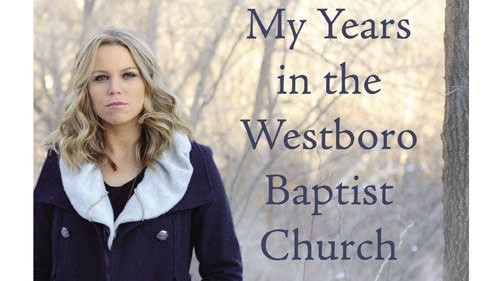My Life in a Cult
Author Lauren Drain speaks out about picketing U.S. solders' funerals and praising the terrorist attacks of September 11 as a teen member of the notorious Westboro Baptist Church — and about how her parents disowned her for questioning the group's shocking tactics.

You've heard about the Westboro Baptist Church (WBC); its members wave outrageous signs — "God Hates Fags," "Thank God for 9/11" — at military funerals and tweet offensive messages like "#GodSentTheShooter" to Sandy Hook Elementary. Now, ex-member Lauren Drain, 27, author of Banished: Surviving My Years in the Westboro Baptist Church (Grand Central Publishing), reveals the details of her life in the secretive, cultlike group and what led to her being shunned by her own family.
You were 15 when your father moved your family from Bradenton, Florida, to Topeka, Kansas, to join the Westboro Baptist Church. How did he get involved?
He was making a documentary about the church and started adopting its fundamentalist views. Even before we moved, he cut me off from friends and called me his evil daughter because I liked boys [the WBC forbids dating].
What does the church believe?
That everyone on earth, except its members, is going to hell. They think society's acceptance of homosexuality dooms us in God's eyes. I was taught that the Holocaust was the Jews' punishment for killing Christ and that 9/11 was God's retribution for our sins. It was our responsibility to deliver that message by protesting at public events.
How often did you picket?
Over seven years I picketed every day, three times a day — funerals, concerts, gay pride events, any place that would get attention. [Founder] Fred Phelps watched Fox News and chose locations based on their stories. I missed class to picket, but I'd make it up later. I even picketed my own high school graduation in a cap and gown, holding a sign that said "Fag Chargers" — our mascot was a charging horse. People screamed and cursed at us, especially at our "Thank God for 9/11" signs. They'd throw trash, bottles, eggs. I was threatened with a knife and shot at with a BB gun. Marines chased me at military funerals. But I was never scared. If I got hurt, I thought that was God's will. The one time I felt ashamed was when I was picketing before the funeral of five murdered Amish schoolchildren [in West Nickel Mines, Pennsylvania, in 2006]. I prayed no one from the media would interview me, because I couldn't explain why I was there.
Church members — mostly relatives of Fred Phelps — live in a compound in Topeka called "the block." What was that like?
Claustrophobic. And there were strict rules. Girls weren't allowed to cut their hair because it was seen as a symbolic covering that showed submission to God. I once got in trouble for using Sun-In. Makeup and revealing clothes were forbidden; we could never expose the "four b's" — boobs, butt, belly, and back.
When did your doubts about the church begin?
After about a year, I started noticing that the rules applied differently to different people. One of Phelps' granddaughters wore revealing clothing yet was never chastised. Later, bigger questions started nagging me. We had signs that read "Soldiers Die, God Laughs," but the Bible says that God has "no pleasure in him that dieth." When I brought that up, they just called me a troublemaker.
Why were you kicked out?
I was answering e-mails sent to the church through our website, and one was from a guy, about my age, named Scott, who struck up a correspondence with me. We started flirting online. My father found out and flew into a rage. Even though I was 21 and working as a nurse, I still wasn't allowed to date — the church had outlawed marriage, calling it a "distraction." One day my dad told me to go pack. I'd been kicked out of the church — and my home. I'd seen members "disfellowshipped" before, cut off from everyone, including family. My father drove me to a hotel where I stayed for two nights, crying and reading the Bible. I called my parents repeatedly, but they wouldn't talk to me.
Get exclusive access to fashion and beauty trends, hot-off-the-press celebrity news, and more.
What is your life like now?
Six months after my expulsion, I was so depressed I could barely function. I found a job as a cardiac nurse and moved to Hartford, Connecticut, where Scott lived. Five years later, I'm 27 and engaged to a Web designer I met online. Now I study the Bible on my own. I still call myself a Christian, but I'll never end up in another extreme church. And I wrote an open apology in the book for my past behavior. It took me a long time to understand how wrong it was. It was so cruel to picket funerals, and no one has the right to judge who is going to heaven or hell. And I don't agree with the church's ideology on homosexuality. I have gay friends now, which I couldn't have imagined before. They know how I was raised, but they don't judge who I was. They love who I am.
Do you talk to your family?
I called my father on his birthday one year. He put me on speakerphone so everyone could hear him disowning me again. I last talked to my mother three years ago. They're still precious to me, but getting kicked out was the best thing that could have happened. I pray mostly for my two sisters and brother. I wish I could tell them that I love and miss them and that how they're being raised isn't the only way to live.